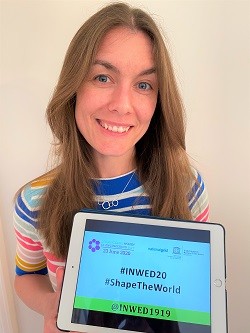
Overcoming imposter syndrome to get gas to net zero
‘Highly commended’ in this year’s list of Top 50 Women in Engineering We50 Awards, Danielle reflects on overcoming imposter syndrome and a career pursuing her passion for sustainability.
It was a teacher who first mentioned engineering as a possible career option for me, mostly because I liked to understand why and how things worked, and enjoyed solving problems. At the time, I didn’t really know what an engineer did, so it inspired me to explore different engineering disciplines through work experience and training courses.
From high-flying academia to RAF jets
I studied maths and physics at the University of Warwick, eventually getting a masters degree and then a PhD in Particle Physics. It was a chance to be creative with science and work as part of an international collaboration of scientists and engineers. I enjoyed it so much that I continued to research and teach at the university for several years afterwards.
I was exposed to large-scale feats of engineering that tried to help answer some of the most fundamental questions.
While I was studying, I did a six-month mechanical engineering evening course at a local engineering firm, a summer project in chemical engineering at a pharmaceutical company, work experience with the RAF maintaining Jaguar jets and was supported through my degree by BAE Systems. As a researcher, I was exposed to large-scale feats of engineering that tried to help answer some of the most fundamental questions. After that, a career in engineering was inevitable.
Steps towards sustainability
Once I decided to leave academia, I knew I wanted to look at opportunities within technical and engineering roles. I’d been working on a spin-off project from my particle physics research, looking at an alternative technology for solar panels, so the energy industry was something I considered.
That’s how I ended up joining National Grid almost a decade ago. Since then I’ve worked in a range of roles, keeping my career interesting and challenging; from using simulation software to support the operation and design of the gas network, to leading work to redesign two of our gas terminals.
Planning a cleaner future for gas
Currently, I’m really excited to be developing a net zero strategy for the UK’s gas transmission network. This gives me the chance to explore new sustainable technologies and low-carbon fuel sources, such as hydrogen, for homes and businesses.
I’d like to … really influence the direction of the energy industry in creating a more sustainable future.

I’m working together with policymakers and other parts of the gas network in the UK to build a programme of work about the role hydrogen might play in our future energy mix, decarbonising industry, power, transport and heat in our homes. There are so many innovative projects needed and already taking place, it’s an exciting time to be in the energy industry.
As for the future, I’d like to keep being challenged, developing and continue to be able to really influence the direction of the energy industry in creating a more sustainable future.
Staying true to yourself
Last year I became a Chartered Engineer through the Institution of Engineering and Technology (IET). It’s something that I’d put off for a long time, as I felt like an imposter without a formal qualification in engineering. I realise now that, with a STEM background, I’d been able to contribute to the field of engineering at a professional level throughout my career though.
Anyone can feel like ‘the other’ and be in the minority in a room, the key is to trust that you deserve to be there and that you’re credible.
I’ve experienced feeling like ‘the other’ many times, whether as the only female in a department, team or meeting, or as the first person in my family to go to university, or as the only engineer in the room without an engineering qualification. Anyone can feel like ‘the other’ and be in the minority in a room, the key is to trust that you deserve to be there and that you’re credible. It’s also easy to put pressure on yourself to fit a mould; while it’s important to be flexible in your style, it’s also important to be yourself.
Diverse workplaces bring diverse thinking
I believe women bring diversity of thought. As a business, it’s important to have a workforce that can relate to and represent the communities we serve. A diverse and inclusive workforce can lead to a more innovative culture, which will be critical when solving the complex sustainability challenges we face today, as well as making it a more attractive and enjoyable place to work, which retains people.
Receiving recognition
I feel incredibly proud about being shortlisted for this year’s We50 awards and recognised as someone who’s contributing to a more sustainable future. I think it’s important to raise the profile of women in engineering and the energy industry, to highlight the opportunities available and to encourage more women, at whatever stage in their career, to get involved!